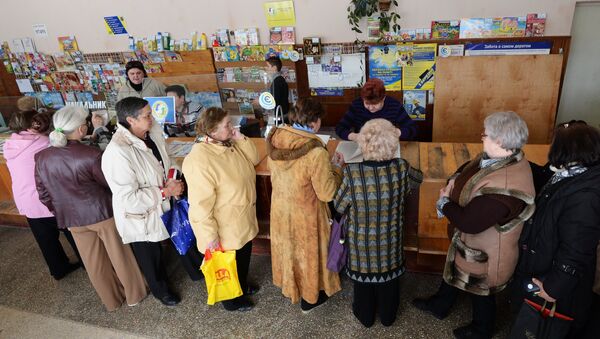IMF officials' latest fact-finding mission to Ukraine has concluded with some unpleasant news for Kiev. On Friday, a press statement put out on behalf of IMF Ukraine mission chief Ron van Rooden indicated that Ukraine would not be getting its next, fifth loan tranche until lawmakers approved the pension and land reform measures which the global monetary organization has been actively pushing.
"Securing parliamentary approval of these draft laws will be needed to pave the way for the completion of the fourth review," the statement said.
Before the IMF mission started, Deputy Prime Minister Pavlo Rozenko repeatedly insisted that Kiev would stick to its position and that the retirement age must remain unchanged. The politician has complained that if the pension age were raised, as the IMF proposes, many Ukrainians simply wouldn't live long enough to receive their pensions.
Ukraine's pension system is a holdover from the Soviet period, with men entitled to claim state pensions at age 60, and women at age 55. In the three plus years after the Maidan coup, pensions have declined significantly relative to the cost of living, averaging as little as $75 US, which in many parts of the country is not enough even to pay for skyrocketing utilities costs (another measure insisted on under the IMF's austerity program).
Asked for comment, economist Alexander Ohrimenko, director of the Ukrainian Analytical Center, said that based on a careful reading of van Rooden's press statement, the chances of Ukraine receiving a fifth tranche from the IMF this year are slim to none.
"If one carefully reads the official statement put out by the IMF mission, one can conclude that there will be no money," Ohrimenko said, speaking to Radio Sputnik.
Ohrimenko added that the IMF is currently unhappy with Prime Minister Volodymyr Groysman's own pension reform proposals.
Since 2014, the Ukrainian economy has faced tremendous tumult, with political and socio-economic instability compounded by Kiev's war against breakaway regions in the country's southeast. The IMF, who with its $17.5 billion credit line has become Kiev's main foreign lender, has pushed Kiev to implement increasingly severe austerity reforms. These have hit Ukrainian pensioners and low-income families particularly hard, and helped to secure Ukraine's place as one of the poorest countries in Europe.




